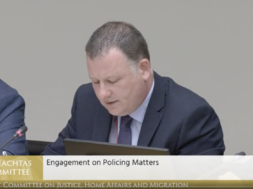Speech by Alan Shatter TD, Minister for Justice, Equality and Defence
Private Members Business – Tuesday 16 July 2013
Second Stage of Garda Síochána (Amendment) Bill 2013
A Cheann Comhairle
I am glad to have this opportunity to respond to the case that has been made for the Garda Síochána (Amendment) Bill 2013.
The Bill has two main objectives. One is to establish of a Garda Síochána Independent Board, and the other is to strengthen the Garda Síochána Ombudsman Commission, and let me deal with each in turn.
Garda Síochána Independent Board
The Garda Síochána Independent Board would have general oversight of the Garda Síochána, in the process taking over many of the existing functions of the Minister and the Government.
The Board would be made up of a chairperson and 15 members, including 4 members of the Houses of the Oireachtas, 2 Commissioners from the Human Rights and Equality Commission, the Ombudsman for Children, the Data Protection Commissioner, the Chief Inspector of the Garda Inspectorate, and 6 other members. It is not clear who these 6 other members would be.
This Board would very significantly change the law relating to the oversight of the Garda Síochána, as set out in the Garda Síochána Act 2005. The Board would take from the Government the power to appoint and dismiss the Garda Commissioner and all of the Deputy Commissioners, Assistant Commissioners, Chief Superintendents and Superintendents. In drawing up the annual policing plan and the 3-year Garda strategy statement, the Garda Commissioner would have regard to the recommendations of the Board, and not, as is currently the case, Government policy. It would also be the Board, and not the Minister, which would approve, with or without changes, the annual policing plan, which sets out the proposals each year for policing the country. The Garda Commissioner would also be obliged to consult the Board on the manner in which the Garda Síochána are distributed throughout the State, whereas at the moment this is entirely a matter for the Commissioner.
The statutory functions of the Garda Commissioner under the 2005 Act would also be changed to require him to have regard to the policies of the Board rather than the Government.
The Bill would delete the statutory provision that makes the Garda Commissioner accountable to the Minister for Justice and Equality for the performance of his functions and those of the Garda Síochána.
Assessment of proposal
I have to say that I not believe that the Bill would achieve its stated aim of improving the democratic accountability of the Garda Síochána. The 2005 Act provides that the Commissioner is accountable to the Minister for the performance of his functions and those of the Force. In turn, as Minister I am accountable to this House. As members will know, I frequently answer questions, take part in debates and generally respond to concerns raised in this House relating to the Garda Síochána, and this has always been the case with my predecessors. I simply cannot accept that the case has been made that transferring key oversight functions to a separate statutory body – such as the appointment and dismissal of senior Garda management and the approval of policing policy – would enhance democratic accountability.
In terms of accountability, it is worthwhile recalling here that, in addition to the Minister of the day being answerable in this House for the Garda Síochána, the Garda Commissioner is, under the 2005 Act, the Accounting Officer for the Garda Síochána. In that capacity he is liable to appear before the Public Accounts Committee. In addition, the 2005 Act established the independent Garda Síochána Ombudsman Commission, which is empowered to carry out independent investigations into Garda conduct. That Act also established the Garda Síochána Inspectorate, which provides expert advice on achieving the highest levels of efficiency and effectiveness in the operation and administration of the Force. The accountability of the Garda Síochána has, through all these measures, been significantly strengthened.
Turning to the concept of a police authority, and that is what the Garda Síochána Independent Board would be, the main argument normally made is that it interposes an additional layer of independent accountability between the political process and the management of a police force. And indeed there are examples elsewhere of police authorities. But it is worthwhile looking more carefully at those examples to see what parallels, if any, there may be between those jurisdictions and ours.
They can be found, for example, in jurisdictions where there are regional police forces, and where regional rather than central accountability is thought desirable. Probably the best known example of this, and one of the most relevant, is the jurisdiction of England and Wales. In England and Wales there are 43 different police forces, and until recently each was answerable to its own police authority, except for the London Metropolitan Police who are answerable to the directly-elected Mayor of London. But in England and Wales police authorities were abolished and replaced last November by directly-elected Police and Crime Commissioners, precisely on the ground that the police authorities were not sufficiently democratically accountable.
It is true that Northern Ireland retains a police authority, namely the Policing Board, and we would all agree that this does a very good job in sometimes difficult circumstances. But I think that everyone would also acknowledge that the need for the Policing Board arises in large measure from the unique circumstances of the North, in particular the need for confidence-building in a cross-community environment.
Another important point often overlooked by those who advocate a police authority is that the Garda Síochána is not only the police service in this jurisdiction but also the security and intelligence service, as well as the border control authority of the State. I have to say that I find it hard to imagine circumstances where control of such critical national functions could be transferred to an unelected body. I certainly can’t easily think of an example in another jurisdiction where responsibility for oversight of these functions has been devolved from Government.
While I have made it clear that I have substantial difficulties of principle with the proposal in this Bill for a Garda Síochána Independent Board, there are also practical issues which proponents of the Bill must address. I think that it is reasonable to ask, for example, whether a Board made up of no fewer than16 persons could operate effectively, especially given the wide range of functions it would have.
It must also be asked whether it would be appropriate for office holders such as the Ombudsman for Children or the Data Protection Commissioner to have direct responsibility for the management of the Garda Síochána, including the appointment and dismissal of senior Garda management and the approval of operational policing policies. The Ombudsman for Children and the Data Protection Commissioner are independent office-holders who, within their areas of responsibility, have important oversight functions relating to the Garda Síochána and the public service in general.
To impose on them direct responsibility for the management and oversight of the Garda Síochána would not be building on their existing functions, but would represent entirely new functions. Their position on the proposed Board would not simply enable them to have more direct oversight of the Garda Síochána in relation to children’s rights or data protection.
They could not limit themselves to that perspective. They would have a common responsibility to oversee and in important ways to manage the entire Force. They, along with the other Board members, would be responsible for appointing and possibly dismissing the entire cadre of senior Garda management. They, along with the other Board members, would be responsible for a wide range of Garda policy. Can this be right? Even in relation to children rights and data protection issues, they would be responsible for Garda policy which in their main roles they would be responsible for overseeing. Is this sensible? Surely this would risk confusing their separate and independent oversight roles with a completely different, and potentially incompatible, management role. I don’t think it is unreasonable of me to ask whether this has been properly thought through.
There are also other more detailed aspects of the composition of the Board that would benefit from more thought. For example, as we have seen, the Bill specifically provides that office-holders such as the Ombudsman for Children and the Data Protection Commissioner – as well as the Chief Inspector of the Garda Inspectorate, by the way, to take another example of potential role-conflict – would be members of the Board. However, it also provides that the special committee which nominates a person to be a member of the Board must be satisfied that the person has the appropriate experience, qualifications, training or expertise for appointment to such a Board. Can I ask what would happen if one of the designated office-holders was not approved by the special committee, an outcome clearly contemplated by the Bill? Or would this simply be a meaningless condition?
Let me also make a few brief comments on two other aspects of this part of the Bill, namely the role of Joint Policing Committees – or JPCs – and human rights.
The role of JPCs is to advise and make recommendations to the Garda authorities and the local authority, as appropriate, in relation to local policing and crime prevention issues. JPCs are an important forum for developing cooperative approaches and enhancing cooperation between Gardaí, local authorities, other relevant agencies as required, and of course local community interests.
JPCs have never been intended to supplant the core policing functions of the Garda Síochána or the statutory functions of local authorities. The Garda Síochána are essential and pro-active participants in each of the 114 existing JPCs, and this participation is strongly supported by the Commissioner and his management team.
The circumstances applying locally will not be the same in each area and it is clearly incumbent on the Commissioner to take an overall national view in framing his annual policing plan. While I and the Commissioner are supportive of the idea of enhancing the role of JPCs, clearly this cannot be done in a way which dilutes or impedes the Commissioner’s responsibility to frame a national policing plan. I am of the view that the present structures allow for full communication of JPC views to the Commissioner, and to myself, through the requirement for JPCs to furnish annual reports under the Act. These are sensible and appropriate arrangements to facilitate the input of JPC views while upholding the essential role of the Commissioner and his statutory responsibilities under the Garda Síochána Act.
I should also point out that the Garda authorities have established a national JPC Monitoring Office to support effective Garda involvement in the JPC process. In addition the Garda authorities have participated with my Department and the Department of the Environment, Community and Local Government in a review of the operation of JPCs which has been ongoing over the last year or so. I am hopeful that, arising from this review process, we will be able to put in place improved operating guidelines for JPCs and enhance the overall communication in relation to their work, both at local level and national level.
On the question of human rights, I recognise that one objective of the Board, as envisaged by the Bill, would be the human rights proofing of all Garda policies, procedures and practices, the monitoring of their implementation, and the development of a human rights-based code of service for all Garda operational policies and procedures.
No one could disagree with the intention behind this aspect of the proposal. We all agree that human rights are central to policing. The Garda Commissioner is fully conscious of the absolute requirement for all members of the Garda Síochána to respect and vindicate the rights of individuals. It is worth noting that all operational Garda Directives make reference to relevant human rights principles to remind all members of the Force of their obligations in this regard.
It is also the case that a Strategic Human Rights Committee was established in 2005 as a result of a recommendation made in a Garda Human Rights Audit that year. The purpose of this committee is to advise the Garda Commissioner and Garda senior management on how to promote human rights policies and procedures internally and externally and ensure that best human rights practice is at the core of the Garda policing service. The House will be interested to know that the Committee includes representatives from human rights experts working in a number of outside bodies, such as the Irish Council for Civil Liberties, Amnesty International (Ireland) and the Irish Human Rights Commission.
I think that any fair-minded person would acknowledge the commitment to human rights that this demonstrates, and also the openness on the part of the Garda Commissioner to direct input from leading Irish human rights bodies. I am not saying for a moment that this excellent work could not be built on. I am not saying that the good progress made so far could not be taken further. But the proposed mechanism for doing this – the Garda Síochána Independent Board – raises real and substantial difficulties of principle and practicality.
Finally, in relation to the wider case for changes to the structure and management of the Garda Síochána, can I just recall in passing that the ‘Haddington Road’ Agreement of May 2013 provides for a review of the Garda Síochána. This review is to commence in September and to conclude no later than 1 June 2014. The review will encompass all aspects of the operation and administration of the Force, and is an opportunity for a range of options to be considered.
Let me now turn to the other main objective of the Bill, namely the amendment of the provisions of the 2005 Act dealing with the Garda Síochána Ombudsman Commission. Let me be quite frank – I think that some changes could usefully be made to the Act as it applies to the Garda Ombudsman Commission, but again any changes need to carefully considered.
One proposed change in the Bill is that the Board, rather than the Government, would nominate persons for appointment to the Garda Síochána Ombudsman Commission. Without going back over the difficulties I have with the concept of the Board in the Bill, is it really argued that the fact that the Government nominates persons for appointment to the Garda Ombudsman Commission somehow compromises their independence? After all, the nominations must be approved by resolutions of both Houses before the successful persons are appointed by the President. Of all the changes one might make to the 2005 Act relating to the Garda Ombudsman Commission, changing such a robust procedure wouldn’t necessarily be the first that would come to mind.
The Bill also proposes a number of other amendments, for example restricting the scope for investigation of complaints under the Garda disciplinary process, removing the requirement for a Garda member to agree to an informal resolution of a complaint, and enabling the Garda Ombudsman Commission to recommend not only a disciplinary hearing but also a sanction.
I believe that some of these issues – which have been aired publicly before – are worthy of consideration. But again I have to say that we need to work though these issues carefully. Key to this consideration will be the views of the Garda Ombudsman Commission itself. They have made proposals to me for change – proposals which differ in some significant respects from the provisions of the Bill – and it is these proposals which must surely be the starting point in this debate. It will also be important to take into account the views of the Garda Commissioner. That is the process in which I am now engaged, and I want to finalise any proposals for change as quickly as a proper consideration of the issues involved will allow.
Can I conclude by acknowledging the genuine objectives behind this Bill, but also by asking, in the same spirit, for an understanding of why, for the reasons of principle and practicality I have outlined, I cannot support it.
ENDS









